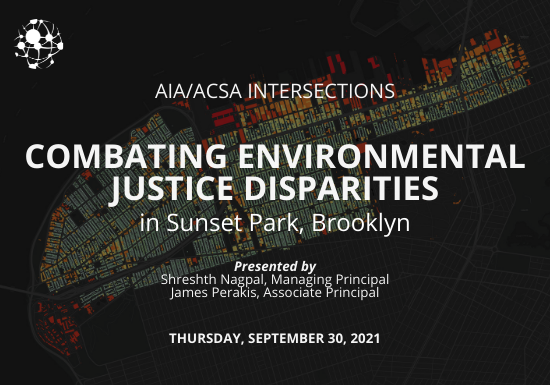Combating Environmental Justice Disparities in Sunset Park, Brooklyn at AIA/ACSA INTERSECTIONS

The American Institute of Architects (AIA) and the Association of Collegiate Schools of Architecture (ACSA) are hosting the second annual joint AIA/ACSA INTERSECTIONS Research Conference dedicated to the INTERSECTION of Education, Research and Practice. This 2.5-day virtual conference will include dynamic presentations of current research and keynotes and sessions offering new ideas, models for practice, and challenging our profession in addressing the critical issue of climate and community. The conference builds on the eight-year partnership between AIA and ACSA toward these objectives. The focus of the INTERSECTIONS programs is intended to strengthen the INTERSECTION between academia and design practice, especially when it comes to research and innovation, focused on community strategies.
Elementa Engineering and Integral Group are proud to be represented at this year’s conference in the session:
Combating Environmental Justice Disparities in Sunset Park, Brooklyn
Thursday, September 30, 2021 | 4:00 PM EDT
Speakers
- Shreshth Nagpal, Managing Principal
- James Perakis, Associate Principal
Abstract
In New York City, highly-polluting power generating facilities known as “peaker plants” are used to produce electricity when demand exceeds normal levels – primarily during the summer months when residents and businesses turn up their air conditioning during heatwaves. Overwhelmingly, peaker plants run on fossil fuels, operate without modern pollution control equipment, and are located in or adjacent to communities of color and low-income communities. By some estimates, peaker plants in New York City emit twice as much carbon dioxide and 20 times as much nitrogen dioxide as regular power plants, contributing to chronic respiratory illnesses among the city’s most vulnerable populations. New York City peaker plants, some of which are more than 60 years old, were originally intended to be used only for peak demand, but now run more frequently to meet the city’s growing energy needs. Fortunately, there are cleaner alternatives in the form of distributed energy resources (DERs), such as renewable energy generation and battery storage, which can be deployed alongside building energy efficiency improvements and demand-response measures to reduce air pollution in environmental justice communities.
This paper presents Elementa’s analysis of DER strategies in Sunset Park, Brooklyn, and how these strategies can reduce the runtime of two peaker facilities – the Gowanus and Narrows generating facilities. There were three primary objectives of this work:
- i) to establish the theoretical potential of each strategy to reduce peak demand,
- ii) to assess the overall impact of peak demand reduction on peaker plant operation, and
- iii) to identify areas for further analysis and research. Our analysis was based on an urban-scale energy model, calibrated to hourly utility data, that was used to identify the main drivers of energy use in the community and assess the potential of various DER strategies.
We will also present this work as a case study in community engagement, highlighting how Elementa worked with the New York State Energy Research and Development Authority (NYSERDA), and two members of the PEAK coalition in New York City – the NYC Environmental Justice Alliance (NYC-EJA) and Uprose – to refine the scope of analysis and create actionable insights related to scenario planning, DER sizing, and project siting. Lastly, we will discuss ongoing work with NYSERDA to translate our analysis into a community energy planning tool to facilitate the implementation of DER strategies in Sunset Park.
Readers should come away with a deeper understanding of the localized health impacts of fossil fuel-based power generation, and the important role that distributed energy resources can play in correcting environmental justice disparities. Our paper will highlight how architects and engineers can help unlock the full potential of distributed energy resources – through better design, engineering, planning, and procurement – to accelerate the transition to a more equitable and sustainable future.
For more information and to register visit AIA/ACSA INTERSECTIONS.
Time: 4:00 PM EDT
Speaker: Managing Principal Shreshth Nagpal + Associate Principal James Perakis
